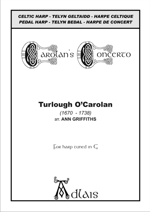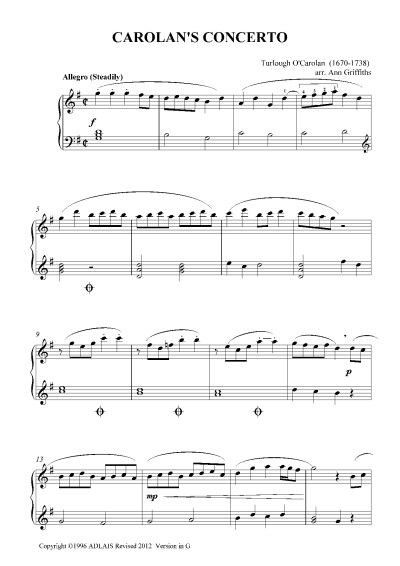 |
|||
| |
of Harp Music |
| © 2004-2025 ADLAIS |
| Carolan's
Concerto (for
harp in G) Turlough O'Carolan (c.1670 - 1738) arr. Ann Griffiths |
return to previous page |
 |
Work: | Single work for solo harp |
| Catalogue No: | Adlais 084 | |
| ISMN: | 979-0-57032-076-9 | |
| Edition: | 2012, A4 | |
| Suitable for: | Grade 3, Lever or Pedal Harp in G | |
| Price:: | £5.00 Go to shop | |
| Examination: | LCM Grade 3 List B (2014-2016) | |
Toirdhealbhach Ó Cearbhallaín, better known today as Turlough O’Carolan - the anglicised form of his name - was born in 1670 near Nobber, County Meath, Ireland. Subsequently, his family moved to the Roscommon-Leitrim district where Mrs McDermott Roe, the wife of his father’s employer, took an interest in his education. At the age of eighteen, Carolan contracted smallpox, as a result of which he became totally blind. His patroness then apprenticed him to a harper for three years, maintaining him until he was a finished pupil. Having provided him with the means of making a living, she equipped him with a horse and provided him with a guide and money, so that he was enabled to set forth on a very successful career as an itinerant harper.
The fashionable popularity of Italian music and Italian musicians in eighteeth-century Ireland was a major influence on the music of performers like Carolan, and thus led to music in the style of this ‘Concerto’, supposedly composed at Castle Bourke, the home of Lord Mayo. Legend has it that Lord Mayo having invited a famous Italian musician to his home, Carolan felt neglected, and having complained was told “When you play in as masterly a manner as he does, you shall not be overlooked”. The account, published in Walker’s Irish Bards of 1786, declares that ‘Carolan wagered with the musician, that though he was almost a stranger to Italian music, yet he would follow him in any piece he played; and that he himself would afterwards play a voluntary, in which the Italian should not follow him. The proposal was acceded to, and Carolan was victorious.’

